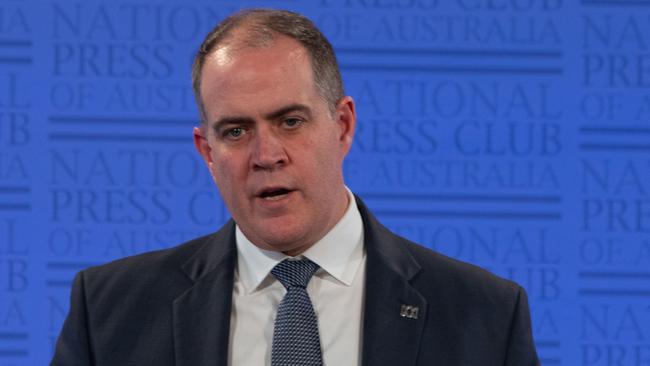ABC boss David Anderson declares any funding from social media sites will go to regional Australia
ABC boss David Anderson declares any funding the public broadcaster receives from Facebook will go straight to regional journalism.

The ABC will direct money it receives from any deal with Facebook to regional journalism, the public broadcaster’s managing director David Anderson says.
The broadcaster is currently negotiating with Facebook over payment for its content, as is News Corp Australia and Nine Entertainment, after the social media giant restored news to its platform late last month.
But Mr Anderson, in a speech at La Trobe University on Monday, said the temporary Facebook news ban was a “clear reminder that Australia needs to be vigilant in the protection of the free and unfettered access to the public interest journalism that underpins our democracy”.
Negotiations between the government and Facebook did not “guarantee that a large digital platform won’t turn its back on Australian users again at some point in the future, prioritising profits to shareholders overseas above the needs of any Australian”, Mr Anderson said.
“We would prefer to do a deal, they are constructive discussions at the moment, very optimistic that we will do one. But we will have to see how we go,” he said.
“If such agreements are reached, and we hope they will be, any additional funds the ABC receives will go directly to public interest journalism where we believe it is currently needed most – regional Australia.”
The ABC operates from 48 locations nationally. Mr Anderson said discussions with Facebook had only just started.
News Corp, the publisher of The Australian, is close to striking an agreement with Facebook that would result in the company paying for its use of journalism on its digital platform.
The Australian reported on Monday that while there had been points of serious difference between News Corp and Facebook, many of those issues had been resolved in recent days.
To date, Seven West Media is the only major media company to have signed a letter of intent to provide news content to Facebook, although smaller publishers such as Private Media and Schwartz Media had reached deals in February.
Google, however, has signed agreements with News Corp, Nine and Seven West Media.
Mr Anderson said Communications Minister Paul Fletcher was clear that there would be no reduction to the ABC’s funding if they were to receive money from social media companies.
“I do not think it will threaten the ABC of future funding, but we do have an expiring news funding program which has been there for nine years,” he said.
The Facebook ban in February had resulted in a significant spike in readers on the ABC’s websites, he said.
“Prior to the Facebook ban of the ABC news app it had gained an average of 3600 users per day,” Mr Anderson said.
“On the day of the ban, this increased tenfold, and continued at that level for a week … in total on that week, 244,000 people started coming directly to ABC.”
Mr Anderson also criticised a government proposal to impose an Australian content quota on the public broadcaster, and said it was an “incursion” into its independence.
“Setting a minimum level of expenditure for television production would reduce our flexibility to appropriately and independently allocate funds across all ABC activities, including news and regional services,” he said.
“It could set a precedent for further interventions in the allocation of the ABC’s budget.”




To join the conversation, please log in. Don't have an account? Register
Join the conversation, you are commenting as Logout